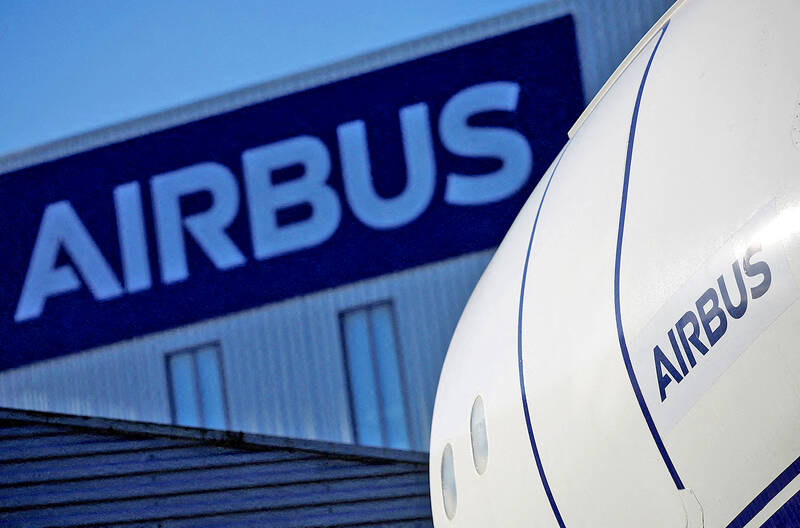Airbus SE is coming up short on the millions of parts that make up the company’s commercial aircraft, and the situation is worsening rather improving for the world’s largest planemaker.
The manufacturer late on Monday said that it is experiencing a shortage on engines, aerostructures and cabin interiors, which in turn is sabotaging the company’s delivery plans.
As a result, Airbus pared back a whole slew of longer-term goals — from operating profit, cash generation and jet handovers to the monthly production rates of its all-important A320 model.

Photo: Reuters
The challenges facing Airbus and rival Boeing Co are caused not by slack demand for its products, but rather a supply chain that has been severely stretched for years. Airbus has long warned of the issue after the COVID-19 pandemic first upended the global aviation industry and then left it unprepared once air travel came roaring back.
What is new is the breadth of the problem, with chief executive officer Guillaume Faury saying that engine shortages are now coming up as the latest pinch point.
“That is a new situation that we were not expecting,” Faury said on a call after Airbus issued its surprise revisions for the year.
The company expects to hand over 770 aircraft rather than 800 units this year. It predicts adjusted earnings before interest and tax to reach 5.5 billion euros (US$5.9 billion) this year, down from a previous goal of as much as 7 billion euros.
The company also cut its outlook for free cash flow before customer financing to about 3.5 billion euros.
Airbus also pushed back its goal to produce 75 of its A320 single-aisle jets per month by one year to 2027. That more conservative approach stands to further intensify a shortfall in new jets, given that Boeing is also making its 737 jets at a significantly reduced monthly rate.
For example, cabin parts are in short supply because airlines are refurbishing older planes, meaning shipments to Airbus are constrained, Faury said.
Many airlines have complained that aircraft deliveries are delayed, forcing them to fly older planes for longer.
The CEO said in an interview earlier this month that any supply issues might persist for the next two to three years.
Faury on Monday said that economic and geopolitical challenges are contributing to the situation and are here to stay “for a while.”
Compounding Airbus’ woes are issues afflicting the engines on its bestselling A320 model, which is powered by RTX Corp’s Pratt & Whitney model or the Leap variant made by the CFM International Inc consortium.
Faury said on the call that the situation has “significantly degraded” in the past few weeks, and that the company would end up with gliders by the end of this quarter — industry parlance for planes without turbines.
Engine issues are becoming more prevalent, after appearing to be more under control last year and beginning of this year, he said.
Airbus would also sustain charges of about 900 million euros related to some space programs, citing “complex and sophisticated products” that created development risks, it said.
As a result, the Toulouse, France-based company would “evaluate all strategic options such as potential restructuring, cooperation models, portfolio review and M&A [mergers and acquisitions] options,” it said.
That review of the troubled space programs is about 70 percent complete, Airbus said on a separate call with analysts.

Nvidia Corp’s GB300 platform is expected to account for 70 to 80 percent of global artificial intelligence (AI) server rack shipments this year, while adoption of its next-generation Vera Rubin 200 platform is to gradually gain momentum after the third quarter of the year, TrendForce Corp (集邦科技) said. Servers based on Nvidia’s GB300 chips entered mass production last quarter and they are expected to become the mainstay models for Taiwanese server manufacturers this year, Trendforce analyst Frank Kung (龔明德) said in an interview. This year is expected to be a breakout year for AI servers based on a variety of chips, as

Sweeping policy changes under US Secretary of Health and Human Services Robert F. Kennedy Jr are having a chilling effect on vaccine makers as anti-vaccine rhetoric has turned into concrete changes in inoculation schedules and recommendations, investors and executives said. The administration of US President Donald Trump has in the past year upended vaccine recommendations, with the country last month ending its longstanding guidance that all children receive inoculations against flu, hepatitis A and other diseases. The unprecedented changes have led to diminished vaccine usage, hurt the investment case for some biotechs, and created a drag that would likely dent revenues and

Global semiconductor stocks advanced yesterday, as comments by Nvidia Corp chief executive officer Jensen Huang (黃仁勳) at Davos, Switzerland, helped reinforce investor enthusiasm for artificial intelligence (AI). Samsung Electronics Co gained as much as 5 percent to an all-time high, helping drive South Korea’s benchmark KOSPI above 5,000 for the first time. That came after the Philadelphia Semiconductor Index rose more than 3 percent to a fresh record on Wednesday, with a boost from Nvidia. The gains came amid broad risk-on trade after US President Donald Trump withdrew his threat of tariffs on some European nations over backing for Greenland. Huang further

HSBC Bank Taiwan Ltd (匯豐台灣商銀) and the Taiwan High Prosecutors Office recently signed a memorandum of understanding (MOU) to enhance cooperation on the suspicious transaction analysis mechanism. This landmark agreement makes HSBC the first foreign bank in Taiwan to establish such a partnership with the High Prosecutors Office, underscoring its commitment to active anti-fraud initiatives, financial inclusion, and the “Treating Customers Fairly” principle. Through this deep public-private collaboration, both parties aim to co-create a secure financial ecosystem via early warning detection and precise fraud prevention technologies. At the signing ceremony, HSBC Taiwan CEO and head of banking Adam Chen (陳志堅)